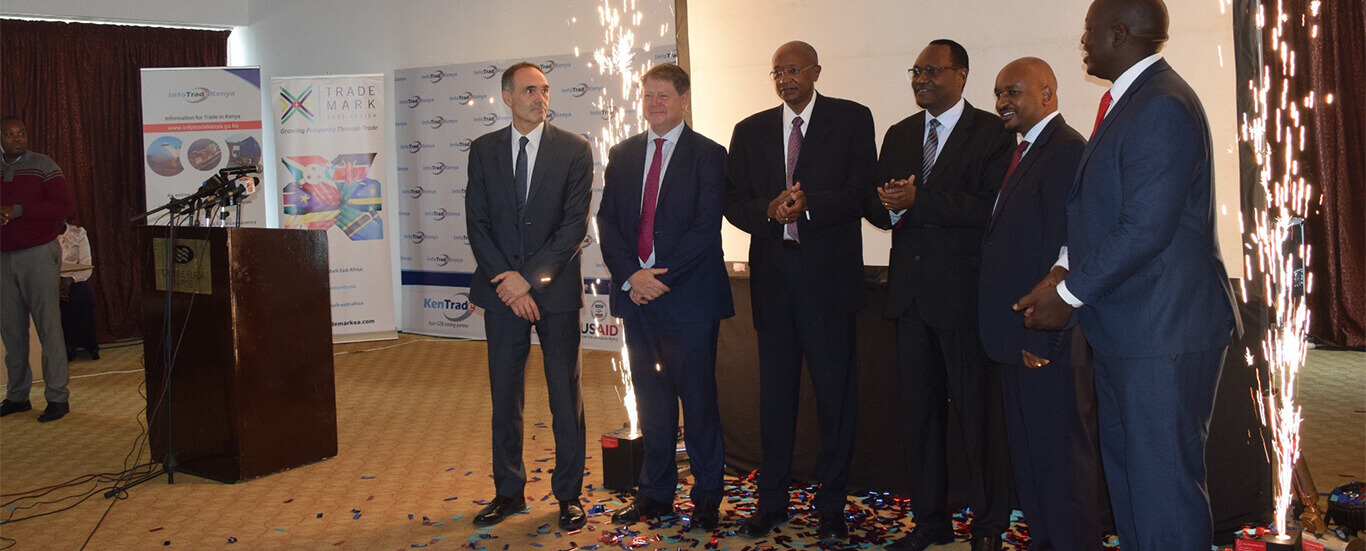- It will take a trader a maximum of 5 minutes to access summarised information on international trade procedures in Kenya.
Nairobi, Kenya, November 22nd, 2017 – Traders in Kenya stand to benefit from increased efficiency following launch of the Information for Trade in Kenya web portal (infotradekenya.go.ke), which has consolidated more than 120 documents and procedures required for import and export business in Kenya on one online platform.
The portal is estimated to serve at least 1.5 million users per month and consolidates 73 documents under exports, 52 under imports and one under transits (cross border trade) thus ensuring a shorter period in the export and import processes. Completion and launch of the information portal makes Kenya the first country in the East Africa Community (EAC) to fulfil Article 1 of WTO Trade Facilitation agreement which requires member states to publish their trade procedures online, displaying them step-by-step, with contact information on enquiry points, access to forms and other required documents and all relevant trade and customs laws.
Kenya Trade Network Agency (KenTrade) implemented the portal with financial support of approx. US$ 498, 000 from United States Agency for International Development (USAID) through TradeMark Africa (TMA). United Nations Conference on Trade and Development (UNCTAD) provided technical assistance.
Presiding over the launch, the National Treasury Principal Secretary, Dr. Kamau Thugge said, “The InfoTrade Kenya portal is part of the Government’s initiative to facilitate trade in line with the World Trade Organization (WTO) Agreement on Trade Facilitation, to which Kenya is a signatory and obliges governments to be transparent and to provide information to businesses.”
He explained that the Government has been at the forefront in streamlining international trade procedures through the implementation of National Electronic Single Window System also known as KENYA TRADENET that has seen improvement of Kenya’s rating in the latest World Bank Ease of Business Index. Kenya advanced by 12 points to position 80, emerging third in Sub Saharan Africa after Rwanda and Mauritius in the Trading Across Borders category.
Principal Secretary, State Department of Trade, Dr. Chris Kiptoo who also attended the event noted that the InfoTradeKenya platform was complimentary to the Kenya Trade Portal which was launched in October 2017. The latter, he clarified, is aimed at promoting Kenyan suppliers to the international market by linking them to global traders.
On the other hand, the InfoTrade Kenya portal was intended to increase access to information on international trade procedures and regulations, cut back unwarranted penalties resulting from documentation errors and enhance trade efficiency. Dr. Kiptoo said that the two portals will be integrated in order to offer seamless information to traders.
Also speaking at the launch KENTRADE CEO Mr. Amos Wangora said,
“If you are a trader, the portal will enable you to access all the relevant documentation requirements for imports and/or exports of your respective commodities from the comfort of your office or place of business. Our aim is to boost Kenya’s efforts to become a globally competitive player in the overall share of trade in the world. It provides the current, potential traders and other stakeholders with total transparency on rules and procedures pertaining to import and export formalities, through detailed, practical and up-to-date descriptions of steps to go through, as seen from the user’s point of view to assist them to make informed business decisions,” Mr Wangora explained.
Mr. Wangora added that the InfoTrade Kenya Portal together with the Kenya Trade Net System (National Electronic Single Window System) would provide an end to end solution on regulatory and documentation requirements in the country and to streamline and simplify trade processes for the business community.
TradeMark Africa, Chief Executive Officer, Frank Matsaert said, “Reducing the barriers to trade in Kenya to increase its trading opportunities internationally remains a key mandate for TMA. We are proud to have partnered with Kentrade and UNCTAD to provide a portal that makes international trade information available, thus simplify the process of exports and imports and reduce the time taken. This portal complements TMA’s other work with government agencies including improving roads, the port, border posts and automation of key trade processes. Ultimately, these interventions will create a conducive business environment in Kenya, promoting job creation and reducing poverty.”
UNCTAD’s head of the business facilitation programme, Frank Grozel, said that the portal uses UNCTADS’s eRegulation content management system that enables transparency and efficiency in Trade therefore helping decision makers and implementers objectively analyze their progress towards effective trade facilitation.
Benefits of the InfoTradeKenya portal to traders and government include:
- Provides a concise summary of foreign trade processes
- Repository of trade related laws, regulations, acts and legislations
- Succinct responses to queries made by traders on compliance issues
- Traders and investors are empowered with prior information to comply with regulatory requirements for importation and exportation of goods.
- Traders are able to perform all trade procedures with fewer time consuming interactions
- Ensures Kenya is compliant with World Trade Organization (WTO) Bali Agreement on Trade Facilitation.
- Provides a step by step guide on foreign trade procedures
- Curbs and reduces the chances corruption
- Boosts Kenya’s efforts to become a globally competitive player
- Provides a trader’s point of view of foreign trade processes
- User friendly and easy to navigate
- Assists government agencies to evaluate and simplify their trade related processes
- Fosters transparency in trade processes
- Improves ease of doing business
- Bridges the information gap on trade processes
- Reduction in penalties resulting from non-compliance
- Reduction errors in documentation.
- Access to complete, timely and accurate foreign trade information














